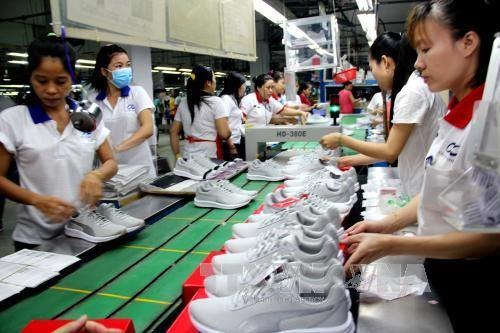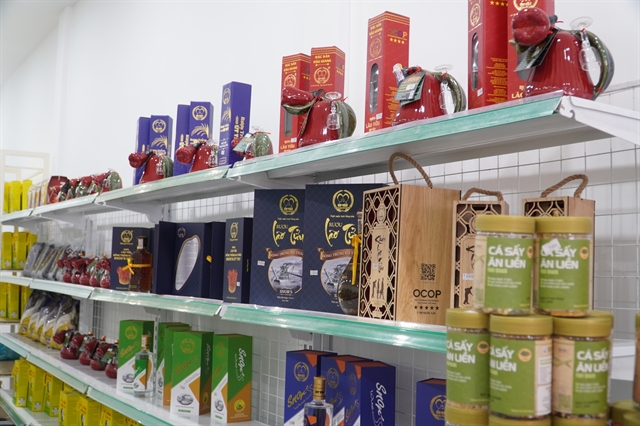 Business Beat
Business Beat

Although Việt Nam’s balance of trade in the first eight months of the year stood at a surplus of US$2.8 billion, analysts warn about it returning to a deficit in the coming months.
 |
| Although Việt Nam’s balance of trade in the first eight months of the year stood at a surplus of US$2.8 billion, analysts warn about it returning to a deficit in the coming months. —VNA/VNS Photo Dương Chí Tưởng |
Compiled by Thiên Lý
Although Việt Nam’s balance of trade in the first eight months of the year stood at a surplus of US$2.8 billion, analysts warn about it returning to a deficit in the coming months.
In August, there was a deficit of nearly $100 million.
Analysts said signs of returning to a deficit had begun, showing in the second quarter when export growth began to slow down.
In the first quarter, exports grew at 22 per cent, but it has been downhill since then, with growth falling to 19 per cent by April-end and 16 per cent by the end of June.
In July, alone export growth was estimated at 15 per cent.
The analysts said running a trade deficit in the last few months of the year is a normal phenomenon since many enterprises’ demand for imported raw materials increases at this time to ensure they can supply enough goods for the peak shopping season at the end of the year and early next year when the Lunar New Year holidays come near.
Others however blamed it at least partly on the trade war between the US and China. The latter has been the biggest importer of Vietnamese goods in recent times, but there has been a sharp decrease in its imports since the war broke out.
There have been on-now-off-now talks between the US and China, but the impasse continues, and with the new tariffs making their products expensive, many Chinese enterprises, particularly small and medium-sized ones, will likely produce less for export to the US, which has caused Chinese demand for products from Việt Nam to plummet.
The Ministry of Industry and Trade said as of August 31, Việt Nam’s exports of agricultural and fisheries products declined in many traditional markets and not just China.
During the month, exports of fisheries products were worth $800 million, down 4.2 per cent from the same period last year.
Besides, the fact that Việt Nam’s exports heavily rely on foreign-owned enterprises also make them volatile.
For instance, in the first quarter of the year, the country’s exports were worth $54.3 billion and South Korea’s Samsung alone accounted for $15 billion, or 27.6 per cent.
This was a period when Samsung was focusing on export of smart phones. But in the second quarter, the company decreased its exports while at the same time increasing imports of components and equipment to serve its production.
Consequently, Việt Nam’s exports fell as did its trade surplus.
Analysts said to reduce the trade deficit and keep export growth steady, various sectors should take the initiative to buy feedstock and raw materials from domestic sources instead of relying on imports.
To enable this, the Government should have policies to encourage both Vietnamese and foreign-owned companies to produce feedstock and accessories needed by businesses that produce key export items.
They also stressed the need for effective support policies to bolster the capacity of enterprises in supporting industries, enabling them to participate in global supply chains.
Banks soon to complete divestment, reduce cross-holding
According to a recent announcement by the Hà Nội Stock Exchange, Vietcombank will divest part of its holding in Military Bank (MB) this month to comply with the State Bank of Việt Nam (SBV)’s regulations on holding shares of other credit institutions.
It will put 53.4 million shares of MB up for auction on October 12 at a starting price of VNĐ19,641 (84 US cents).
If the auction is successful, it will fetch a minimum of VNĐ1.5 trillion ($63.29 million) for the lender.
The divestment will see Vietcombank’s stake in MB go down from the current 6.97 per cent to 4.5 per cent, thus complying with the SBV’s regulations.
Circular 36 allows banks to own shares in a maximum of two other credit institutions, with the stake in each not exceeding 5 per cent of the total charter capital of that institution.
Earlier, Vietcombank had sold out its stakes in the Orient Commercial Bank (OCB). The bank will also have to offload its shares of Eximbank, in which it holds an 8.19 per cent stake.
Vietinbank has completed the sale of its stake in Saigonbank, while Eximbank sold its entire 7.8 per cent holding in Sacombank.
Analysts said the reduction of cross-ownership in the banking sector is imperative since it has had adverse effects like causing a high rate of non-performing loans.
This was because many banks increased their charter capital to several thousand billions of đồng; however, the capital source was unreal as it came from loans taken from other banks.
The issue has not been handled properly and continues to affect the industry though it has been five years since the stake sale was ordered by the central bank.
Analysts attributed the tardy divestment process to the low prices of bank stocks.
Selling them at low prices would not be fair to their shareholders, they pointed out.
But now the prices of bank shares have increased significantly.
Vietcombank sold all 1.47 million shares of OCB it had held through an auction on September 7.
According to the Hà Nội Stock Exchange, two individual investors bought the shares for more than VNĐ30 billion ($1.27 million).
The winning bids for the shares averaged VNĐ20,501, and ranged between VNĐ22,200 and VNĐ20,500. Vietcombank had set a minimum price of VNĐ18,876.
In April, the bank had sold 6.67 million OCB shares at an average price of VNĐ25,771 against a minimum price it had set of VNĐ13,000, earning VNĐ171.96 billion in the process.
The market recovery and high prices of bank shares are encouraging lenders to quickly sell off their stakes in other banks.
Eximbank sold its stakes in Sacombank for nearly VNĐ648 billion.
According to StoxPlus, bank and real estate shares are expected to lead the market recovery and account for 40 per cent of the total market capitalisation.
Bank stocks are highly attractive to investors also because of the high profits many banks expect to achieve this year.
In the first half of the year, the country’s 22 listed banks achieved a combined after-tax profit of VNĐ37.173 trillion, a year-on-year increase of 53 per cent. — VNS




